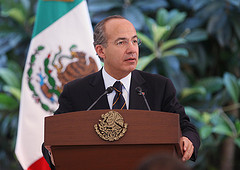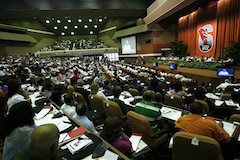
Blog, Cuba, Videos
Raúl Castro’s Speech At Cuba’s Sixth Communist Party Congress
April 17, 2011 By Staff
The growth of the non-public sector of the economy, far from an alleged privatization of the social property as some theoreticians would have us believe, is to become an active element facilitating the construction of socialism in Cuba since it will allow the State to focus on rising the efficiency of the basic means of production, which are the property of the entire people, while relieving itself from those management of activities that are not strategic for the country.
This, on the other hand, will make it easier for the State to continue ensuring healthcare and education services free of charge and on equal footing to all of the people and their adequate protection through the Social Welfare System; the promotion of physical education and sports; the defense of the national identity; and, the preservation of the cultural heritage, and the artistic, scientific and historic wealth of the nation.
Then, the Socialist State will have more possibilities to make a reality of the idea expressed by Martí that can be found heading our Constitution: “I want the first Law of our Republic to be the Cubans’ cult of the full dignity of man.”
It is the responsibility of the State to defend national independence and sovereignty, values in which the Cubans take pride, and to continue securing the public order and safety that make Cuba one of the safest and most peaceful nations of the world, without drug-trafficking or organized crime; without beggars or child labor; without the mounted police charging against workers, students and other segments of the population; without extrajudicial executions, clandestine jails or tortures, despite the groundless smear campaigns constantly orchestrated against us overlooking the fact that such realities are, foremost, basic human rights that most people on Earth can’t even aspire to.
Now, in order to guarantee all of these conquests of Socialism, without renouncing their quality and scope, the social programs should be characterized by greater rationality so that better and sustainable results can be obtained in the future with lower spending and keeping the balance with the general economic situation of the country.
As you can see in the Guidelines, these ideas do not contradict the significance we attach to the separate roles to be played in the economy by the state institutions, on the one hand, and the enterprises, on the other, an issue that for decades has been fraught with confusion and improvisations and that we are forced to resolve on a mid-term basis in the context of the strengthening and improvement of institutionalization.
A full understanding of these concepts will permit a solid advance while avoiding backward steps in the gradual decentralization of powers from the Central to the local governments, and from the ministries and other national agencies in favor of the increasing autonomy of the socialist State-funded companies.
The excessively centralized model characterizing our economy at the moment shall move in an orderly fashion, with discipline and the participation of all workers, toward a decentralized system where planning will prevail, as a socialist feature of management, albeit without ignoring the current market trends. This will contribute to the flexibility and constant updating of the plan.
The lesson taught by practical experience is that an excessive centralization inhibits the development of initiatives in the society and in the entire production line, where the cadres got used to having everything decided “at the top” and thus ceased feeling responsible for the outcome of the entities they headed.
Our entrepreneurs, with some exceptions, settled themselves comfortably safe and quiet “to wait” and developed an allergy to the risks involved in making decisions, that is, in being right or wrong. This mentality characterized by inertia should definitely be removed to be able to cut the knots that grip the development of the productive forces. This is a pursuit of strategic significance, thus it is no accident that it has been reflected one way or another in the 24 guidelines contained in Chapter I, “Economic Management Model.”
As far as this issue is concerned, we cannot indulge in improvisations or act hastily. In order to decentralize and change that mentality, it is indispensible to elaborate a framework of regulations clearly defining the powers of and functions at every level, from the national to the local, invariably accompanied by the corresponding accounting, financial and management oversight.
Progress is already being made in that direction. The studies began almost two years ago for improving the operation as well as the structure and makeup of the government at the different levels. These resulted in the enforcement of the Council of Ministers Regulation, the reorganization of the work system with the State and Government cadres, the introduction of a planning procedure for the most important activities, the establishment of the organizational bases to provide the Government with an accurate and timely information system supported by its own info-communications infrastructure, and the creation of the provinces of Artemisa and Mayabeque, on experimental basis and under a new structural and functional concept.
To begin decentralizing powers, it will be necessary for the cadres of the State and the companies to redeem the obvious role of contracts in the economy, as expressed in guideline number 10. This will also help bring back order and discipline to making and obtaining payments, a subject in which a good part of our economy has been getting poor grades.
As a no less important byproduct, the appropriate use of contracts as regulatory instruments of relations among the various economic actors will become an effective antidote against the extended habit of “reunionism,” that is, calling an excessive number of meetings and other collective functions, often presided by senior officials and uselessly attended by many others, only to enforce what the parties involved recognized as rights and obligations in the contract signed, and whose fulfillment they have failed to demand from those required to do so.



2 Comments
[…] made the comments during a two-and-a-half-hour speech to inaugurate Cuba’s Sixth Communist Party Congress, the first such meeting the island has seen for 14 years. Castro convened the Congress to discuss […]
[…] Latin America News Dispatch, Apr 22, 2011 – […]
Comments are closed.